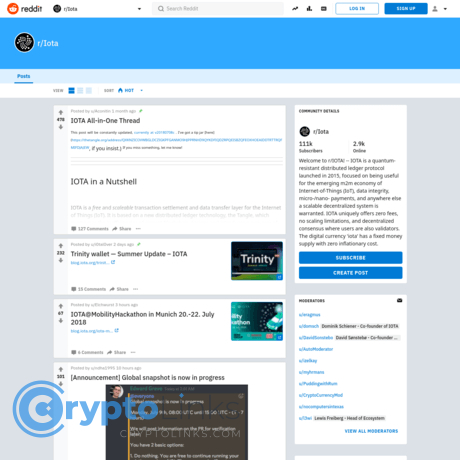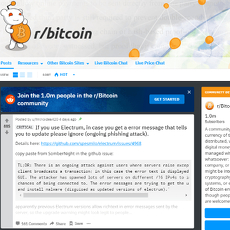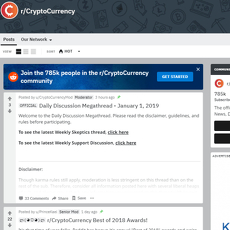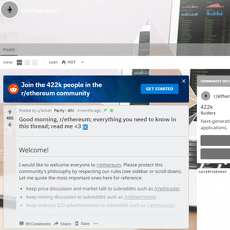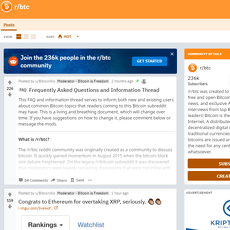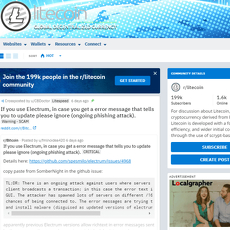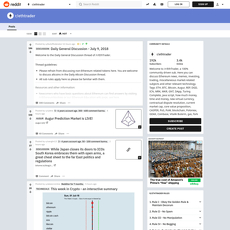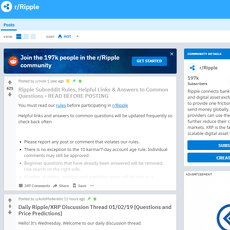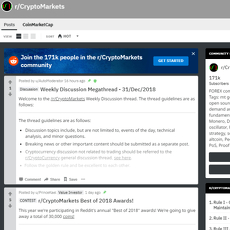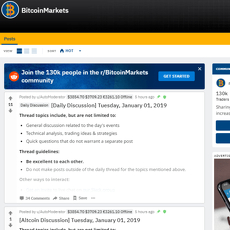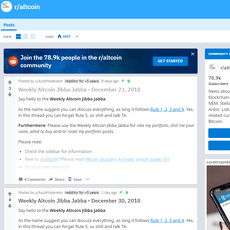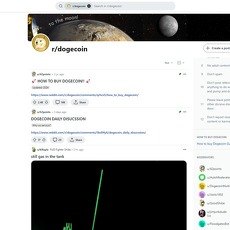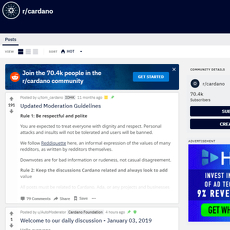r/Iota Review
r/Iota
www.reddit.com
r/Iota Reddit Review Guide: How I Use the IOTA Subreddit Without the Noise
Are you eyeing the r/Iota subreddit but worried it’ll be another time sink full of hype and half-answers?
I’ve been using r/Iota for years to track real updates, find credible threads fast, and get quick context on IOTA’s roadmap—without falling into the price-chatter spiral. If you’ve felt lost between “to the moon” posts and dense tech talk about the Tangle, you’re not alone.
Here’s my promise: I’ll show you how I actually use r/Iota to surface official updates, spot quality discussions in minutes, and avoid the common traps that waste time.
Why most crypto subreddits feel chaotic
Let’s be honest. Most crypto subreddits mix solid information with noise. You’ll see:
- Price hype drowning out substance — Threads spike on green candles, then vanish when the market cools.
- Outdated links and screenshots — Wallet updates, testnets, and docs change fast; old posts often mislead new readers.
- Speculation over sources — Bold claims rarely include GitHub links, release notes, or official posts.
- Jargon overload — Terms like “Tangle,” “DAG,” “UTXO,” and “Shimmer” can make newcomers bounce.
That combination makes it hard to tell what’s real progress vs. what’s just noise. And because a lot of people get their crypto “news” through social feeds, low-quality threads can shape sentiment quickly. For context, research from organizations like Pew Research Center shows many adults rely on social platforms for news—great for reach, risky for accuracy.
On r/Iota, the upside is that strong posts do surface. The trick is knowing where to look and what to trust.
What I’ll help you do, concretely
When I scan r/Iota, I don’t read everything. I zero in on specific patterns that consistently lead to real updates:
- Follow threads with verifiable sources — Links to the IOTA Foundation blog, GitHub releases, or mod-pinned posts.
- Sort and filter smarter — “Top (This Month)” + targeted keywords like release, wallet, Shimmer, or ecosystem.
- Skim top comments by power users — Often where the best summaries and clarifications live.
- Save, verify, and track — I save credible threads, then cross-check with official channels before acting on anything.
Example: when a wallet update drops, there’s usually a thread linking to release notes and a comment explaining migration steps and known issues. I scan for those specifics first, then click through to the official repo to confirm.
Who this guide is for
- Beginners who want plain-English pointers and fewer tabs.
- Investors who track real updates without falling into price-only chatter.
- Builders who need fast access to dev news, docs, and credible community tools.
What you’ll learn
- What IOTA is in simple terms—and why the subreddit matters in the bigger picture.
- How to navigate r/Iota for news, dev updates, and market chat without wasting time.
- Fast answers to common questions (price basics, purpose, real-world examples).
- Safety habits to avoid scams and keep your wallet secure.
- My verdict on when and how to use r/Iota in your research flow.
No hype, no jargon you don’t need. Just a clean way to use r/Iota like a pro.
Ready for the next step? In the following section, I’ll break IOTA down in under five minutes—what it is, why it exists, and how r/Iota fits into the picture. Curious how the Tangle actually changes things for real-world systems? Let’s answer that next.
IOTA in 5 minutes: what it is and why r/Iota matters
The point of IOTA, in plain English
If you strip away the jargon, IOTA is a public-good infrastructure built to make digital interactions trustworthy. It runs on the Tangle—a Directed Acyclic Graph (DAG) where every new transaction confirms others. No miners, no blocks, and a design that aims for feeless transfers and verifiable data trails.
What that means for you and me:
- Data you can trust: sensor readings, documents, and proofs can be anchored to an immutable, auditable ledger.
- Micro-value exchange that makes sense: machines and services can exchange tiny payments without fees eating the value.
- Open rails for builders: an L1 designed for enterprises, governments, and devs who need verifiable data without bottlenecks.
Quick ref if you want the official take: iota.org/learn/intro.
Real-world problems IOTA aims to solve
IOTA shines where authenticity, traceability, and machine-to-machine coordination matter. Here’s where I’ve seen it make practical sense:
- Supply chain authenticity: Each handoff of a product (pharma, auto parts, luxury goods) can be time-stamped on the Tangle. That audit trail helps expose counterfeits and prove origin. The need is real—WHO estimates about 1 in 10 medical products in low- and middle-income countries are substandard or falsified, and an OECD/EUIPO study pegs fake trade at ~3% of global trade. A tamper-evident ledger turns “we think it’s real” into “here’s the proof.”
- Data integrity: From environmental sensors to quality checks in factories, data can be signed and anchored so no one can quietly “fix” it later. That’s huge for compliance and audits.
- Machine economy payments: Think EVs paying charging stations per kilowatt, or devices paying for API calls per request. Tiny, automated, feeless transactions unlock use cases that never made economic sense before.
If you want to explore more practical examples, I recommend scanning IOTA’s use-case pages and case studies via the official channels and neutral explainers like Finance Unlocked for industry context. Start here and branch out: IOTA Learn and the IOTA Foundation blog.
Why r/Iota is useful in this context
When I’m tracking whether anything meaningful is happening, r/Iota gives me signal I can check and save. It’s where Foundation updates, GitHub releases, research threads, and community tools show up in one place—and it’s searchable. That last part matters. X/Twitter scrolls past; Reddit lets you find it again.
What I look for there:
- Official announcements linked straight to the Foundation blog or GitHub tags.
- Research and protocol discussions where engineers answer tough questions in the comments.
- Community tooling like explorers, dashboards, and scripts—often with source code you can verify.
“In God we trust; all others must bring data.” — W. Edwards Deming
That’s the culture I expect to see in a good subreddit: links, proofs, and people willing to back claims with repos and docs.
What to expect on the subreddit
It’s a mix, and that’s fine—as long as you know what you’re after:
- Announcements: protocol updates, wallet releases, ecosystem grants.
- Tech Q&A: node ops, Tangle mechanics, testnet notes, performance talk.
- Ecosystem posts: apps on IOTA/Shimmer, integrations, hackathons.
- Market chatter: sentiment and headlines—useful for context, not decisions.
- “Hot takes” and debates: sometimes spicy, sometimes insightful—worth reading when sources are attached.
If you’ve ever watched a parcel hop three countries and still worried the meds or parts inside weren’t legit, you already feel the problem IOTA aims at. The magic is turning that anxiety into a verifiable trail you can check. Want the exact post types and settings I use to surface that signal fast—without wasting an hour scrolling?
Up next: which rules, flairs, and threads I read first to save serious time.
r/Iota at a glance: rules, culture, and what to read first
Quick stats and the link
Open r/Iota in a fresh tab and give it a scroll:
https://www.reddit.com/r/Iota/.
You’ll find an engaged, technical-leaning crowd that mixes real engineering updates with pragmatic market chatter.
- Vibe: Builder-friendly, allergic to hype, quick to source claims.
- Content balance: News drops, dev notes, wallet releases, ecosystem tools, plus thoughtful Q&A.
- Tempo: Spikes around releases and research posts—perfect for catching real progress.
“Trust the data, not the drama.”
Rules, flairs, and posting etiquette
Before you comment, skim the sidebar rules. It’s simple: keep it useful, cite your source, and respect the room. Mods are active and they do remove low-effort hype, spam, and anything scammy.
- Use flairs right: News, Discussion, Tech, Help. If you’re sharing a release, pick News/Announcement or Tech; asking for wallet guidance belongs under Help.
- Source your claims: Link to the IOTA Foundation blog, GitHub tags, docs, or an official statement—opinions are welcome, but unlabeled rumors aren’t.
- Be clear and specific: Good title: [Release] Firefly wallet X.Y.Z – changelog + download (official link). Bad title: IOTA to the moon!!!
- No “support” in DMs: Keep help requests in public threads so mods and power users can step in.
When in doubt, imagine you’re writing for someone new who wants to verify everything in 60 seconds.
Recurring threads and must-follow post types
There’s a rhythm to r/Iota. Once you see it, you’ll spot the signal fast.
- Weekly discussion threads: Great for quick questions, sentiment checks, and pointers to fresh repos.
- Major releases: Wallet updates, node software (e.g., Hornet), or protocol milestones. These usually link to GitHub or the Foundation blog—save them.
- Dev updates and research: Tangle explanations, testnet notes, and design discussions. Comments often contain the best clarifications.
- Ecosystem roundups: Community tools, dashboards, and integrations. Ideal for discovering what’s actually shipping.
- AMAs and mod stickies: When pinned, read them first—top comments often correct misunderstandings fast.
Pro move: save comment chains where moderators or known contributors jump in. That’s where the gold usually lives.
Search, sort, and filters that save time
The right filters cut your scroll time in half. Here’s my quick routine:
- Sort: Top → This Month for a high-signal catch-up; New during release windows to watch updates as they land.
- Flair filter: Tap the flair pill and select News/Announcement or Tech to focus on official updates and build content.
- Keywords I use: “release”, “wallet”, “Shimmer”, “Hornet”, “EVM”, “ecosystem”, “testnet”, “roadmap”.
- Google trick:site:reddit.com/r/Iota “release” OR “github” to surface older, high-value threads Reddit search sometimes buries.
- Save and follow: Use Save on evergreen posts (wallet guides, migration notes) and Follow for posters who consistently link to repos or official statements.
How I judge credibility
Hype is cheap. Evidence isn’t. I run every big claim through this quick checklist:
- Primary sources: Is there a link to the IOTA Foundation blog, docs.iota.org, or a GitHub release with a tagged version?
- Specifics over slogans: Changelog, commit hashes, release notes, or devnet/testnet identifiers beat “game-changing” promises.
- Poster history: Do they consistently add sources, answer questions, and avoid price bait? A helpful comment history is a strong signal.
- Cross-verify: Can I confirm it via an official channel or two independent sources?
- Time stamps: Is it recent? Old wallet links and deprecated guides are a common pitfall.
There’s a reason I’m strict here. Independent research out of MIT found that false news spreads faster than true stories on social platforms. That’s your reminder to lean on sources and verification:
MIT study summary.
If a post feels exciting but light on proof, I save it, ask for sources in the thread, and only act once links check out. Simple, calm, effective.
Want the exact places I look for breaking news, the builder posts worth following, and the fast way to keep market chat from wasting your morning? Keep going—next up, I show how I separate news, tech, markets, and safety in minutes.
Finding the signal: news, tech, markets, and safety
News and Foundation updates
If you only have a few minutes each week, this is where your time pays off. I scan posts tagged News or Announcement, then I confirm anything exciting against official sources before I form an opinion.
- Cross-check quickly: open the post, then open the official IOTA Foundation blog, the repo on GitHub, and the docs on wiki.iota.org.
- Signals I trust: a link to the Foundation blog, a GitHub release tag, and a changelog with dates. If the thread has a mod flair or is pinned, even better.
- Where summaries live: top comments from power users usually condense jargon into one-liners. Save those. The best TL;DRs often aren’t the OP.
Sample workflow: see a post titled “Announcement: Protocol upgrade live on testnet.” I click through to the official blog article, read what changed and why, check the corresponding repo (e.g., Hornet or tooling) for a release tag, then skim the top comment for context like migration steps or wallet impact. Two minutes, zero guesswork.
“In a market that never sleeps, calm beats FOMO. Verify once, act once.”
Bonus tip: on GitHub, hit Watch → Releases only for key repos under iotaledger. You’ll get an email the moment something ships, even before Reddit sees it.
Tech and builder content
When I want real signal, I check posts with Tech flair or threads that link to code, diagrams, or benchmarks. That’s where builders hang out and where buzz turns into substance.
- What to look for: Tangle explanations with diagrams, testnet notes, node guides (often referencing Hornet), SDK updates, and research discussions that cite papers or specs.
- Search shortcuts: in the subreddit search, try queries like release, Hornet, node, Shimmer, wallet, DevNet, roadmap. Sort by Top → This Month to skip noise.
- Save and build: threads that link to docs or repos get a hard Save from me. I keep a “learning” folder of posts with diagrams and a “shipping” folder with releases and how‑tos.
- Practical sanity checks: if someone claims a performance boost or new feature, I look for a reproducible benchmark or a PR with the change. No code, no crown.
Real example of a high-signal thread: a community tutorial that spins up a node, links to the official Hornet docs, and includes logs, configs, and a troubleshooting section. That post is worth 10 hype tweets because it teaches and proves.
Price talk without the noise
Market chatter will always show up. I treat it as a real-time sentiment feed, not a trade trigger. Studies of crypto communities consistently find that social sentiment can be short-lived and noisy, and coordinated hype is a risk. For instance, research on crypto “pump-and-dump” behavior documents how social channels can be gamed to create temporary price spikes (e.g., Hamrick et al., arXiv).
- My rule: pricing and charts come from trackers, not Reddit. I cross-check price on two sources, then use r/Iota to understand why people feel bullish or cautious.
- Sentiment snapshot: if a market thread has lots of comments but low upvotes, that’s conflict or confusion; if it’s highly upvoted with few comments, that’s often short-term optimism. Neither equals a buy/sell signal.
- Zero FOMO policy: no matter how good the comment thread sounds, I wait for official confirmation of catalysts (releases, partnerships, network milestones) before I let it influence my research notes.
This is not financial advice. Treat the subreddit like an information layer over your data, not a substitute for a strategy.
Scam spotting and safety basics
Crypto is a magnet for social engineering. Chainalysis’ Crypto Crime Report shows scams remain one of the top revenue drivers for crypto criminals each year (source). r/Iota’s mods are active, but you still need a personal checklist.
- Seeds are sacred: never share seed phrases or private keys. No support staff will ever ask for them.
- Avoid “support” DMs: if you post a wallet issue, scammers may DM you pretending to help. Ignore DMs. Ask questions publicly so mods and veterans can weigh in.
- Only official wallets: download Firefly or any official tool from the verified domain, and bookmark it. Watch for lookalikes like i0ta[.]org (with a zero) or fake GitHub mirrors.
- Verify files: check hashes/signatures where provided. When in doubt, navigate from iota.org to the wallet/docs link rather than trusting a random URL.
- Hardware helps: consider a hardware wallet and enable passphrases. Keep device firmware up to date.
- Browser hygiene: use an up-to-date browser, a password manager, and TOTP 2FA for exchanges. Don’t store seeds in screenshots, cloud notes, or email drafts.
- Report fast: spot a bad link or suspicious comment? Hit Report and tag a mod in the thread. Public awareness helps block repeat attempts.
Quick tell for fakes: “urgent,” “limited slots,” or “double your tokens” language, plus off-platform contact requests. If a post is pushing you to act fast, slow down. Security loves patience.
Have basic questions you want answered in seconds—like “How much is 1 IOTA right now?” or “Which wallet and where do I check updates?” Keep going; I’ve lined up a fast, no-fluff FAQ next that covers exactly that and more.
FAQ cheat sheet for r/Iota readers
How much is 1 IOTA worth?
If you see a price in a Reddit screenshot, assume it’s stale. I check live pricing in two clicks and move on:
- CoinGecko: IOTA price
- CoinMarketCap: IOTA
- Coinbase: IOTA converter
Example format you’ll see on a converter: “1 IOTA = $0.14 USD” — that kind of number changes by the second. I use subreddit comments for sentiment, not as a buy/sell signal.
“Trust is a feeling. Verification is a habit.”
What is the point of IOTA?
IOTA is built to make digital interactions trustworthy and scalable using the Tangle (a DAG-based distributed ledger), so data and value can move securely with minimal fees. It targets builders, enterprises, and public sector teams that need verifiable data sharing, identity, and micro/value transfer at scale.
Quick primer: iota.org/learn/intro
What real-world problems does IOTA solve?
Think “prove it” moments in the real world: where goods, data, or machines need to prove authenticity, origin, or state — without trusting a single middleman.
- Supply chain authenticity: Certificates and provenance stamped on the Tangle help fight counterfeits in pharma, auto parts, fashion, and perfume. Example initiative: TLIP (Trade Logistics Information Pipeline) has showcased how border documents and shipment data can be verified across agencies.
- Data integrity: Log files, sensor streams, and audit trails are anchored so anyone can verify nothing was tampered with. Developers often point to IOTA Identity for self-sovereign identity and verifiable credentials in pilots.
- Machine economy: Devices can transact value or exchange trusted data with minimal fees. A known public case: EnergieKnip (NL city rewards program) explored IOTA to reward residents for energy-saving actions.
If you search r/Iota for “TLIP,” “Identity,” or “EnergieKnip,” you’ll find community breakdowns, links to official posts, and dev commentary. For a broad industry explainer on applications, see Finance Unlocked’s overviews.
Where can I follow official updates?
I keep these in my bookmarks so I can validate claims I see on Reddit in seconds:
- IOTA Foundation blog — official announcements, partnerships, releases
- IOTA GitHub — commits, tags, and release notes for the truth on tech progress
- IOTA on X — real-time alerts; cross-check with blog/GitHub for depth
- On r/Iota, scan mod-pinned and “News/Announcement” posts, then read top comments for context and Q&A
Wallets, staking, and Shimmer basics
There’s a lot of noise around wallets and “earn” posts. I stick to three simple rules and avoid headaches:
- Use the official wallet: Firefly only. Verify downloads via the Firefly GitHub Releases. Check signatures/checksums when possible.
- Never share your recovery phrase: No support person, mod, or “engineer” will ever ask. Ignore DMs. Ask wallet questions in public threads so mods can step in.
- Shimmer (SMR): Shimmer is the staging network for IOTA’s tech and ecosystem. Start at shimmer.network and look for official blog updates about features and programs.
- “Staking” and rewards: Opportunities change over time. r/Iota usually flags new events fast, but I only act after I confirm details on the IOTA blog and in Firefly’s official announcements.
- Find the latest on Reddit fast: search “wallet”, “Firefly”, “Shimmer”, and “release”, then sort by Top or New this month to catch active, credible threads.
If you’re ever unsure, post your question publicly with links you’re considering. The community and mods are quick to flag fakes.
Want the exact tool stack and bookmarks I keep open while I scan r/Iota so I don’t miss anything important? I’ll show you what I use every day next — which one do you want first: pricing, code, or official news trackers?
Tools and resources I keep handy while browsing r/Iota
Official links for trustworthy info
When a headline hits r/Iota, I want to verify it in under 60 seconds. These are my open-in-a-new-tab staples:
- Learn IOTA: iota.org/learn/intro — fast, plain-language refreshers.
- Foundation Blog: blog.iota.org — official announcements and deep dives.
- Docs (Wiki): wiki.iota.org — Firefly, nodes, EVM, dev guides.
- GitHub (all repos): github.com/iotaledger — check releases, tags, issues, and commit history.
- Wallet: firefly.iota.org and Firefly GitHub — verify downloads and version notes.
- Explorers:
- Mainnet: explorer.iota.org
- Shimmer: explorer.shimmer.network
- IOTA EVM: explorer.evm.iota.org
- Shimmer EVM: explorer.evm.shimmer.network
- Research: research.iota.org — consensus, Tangle papers, and protocol notes.
- Ecosystem overviews: iota.org/ecosystem and shimmer.network/ecosystem
Pro tip: If a Reddit post claims “new release,” I look for a matching GitHub tag and release notes. No tag, no rush.
Price and market trackers
I use subreddit chatter for context, not decisions. For price checks, I go with two independent sources:
- CoinGecko: coingecko.com/en/coins/iota
- CoinMarketCap: coinmarketcap.com/currencies/iota
- Coinbase converter (quick glance): coinbase.com/converter/iota/usd
- Messari profile (methodology + metrics): messari.io/asset/iota
Cross-compare the numbers and check the 24h volume sources before you trust any spike. Social platforms can be noisy; research shows false claims travel faster than verified ones on large networks, so I always validate before acting.
Reference: Vosoughi, Roy, Aral (Science, 2018) — The spread of true and false news online.
Community and dev hubs
When I want stronger signal than a comment thread, I go where builders and mods talk:
- Reddit: r/Iota — indexed discussions you can bookmark and search.
- Discord (official): discord.iota.org — dev channels, node ops, support rooms.
- Official community page (to find verified links, including Telegram): iota.org/community
- X/Twitter (announcements): twitter.com/iota
- GitHub Issues/Discussions: look under specific repos like Hornet or Firefly
Never trust DMs for support. Ask in public channels where mods and other users can verify answers.
My research workflow
This is exactly how I cut through noise when browsing r/Iota:
- Scan “Top (This Month)” on r/Iota for high-signal posts. I skim headlines with flairs like News/Announcement and Tech.
- Save anything with credible sources (links to the blog, docs, or GitHub). I also click through the OP’s profile to gauge past contributions.
- Verify the claim:
- Release? Check the GitHub tag, release notes, and commit dates.
- Network update? Glance at the explorer and the docs’ changelog.
- Wallet news? Confirm on Firefly site and its GitHub releases page.
- Set alerts so I don’t babysit tabs:
- GitHub “Watch → Releases only” on key repos (Hornet, Firefly, node SDKs).
- Follow the IOTA blog and Foundation on X for real-time pings.
- Use Reddit’s save and follow on reputable posters.
- File it or act: add notes to my tracker with links; if it affects my setup (e.g., node or wallet), I plan the update window and read comments for gotchas.
Example in action (how I vet a “New Firefly release” post fast):
- Open the post and jump to top comments for mod or Foundation confirmations.
- Open Firefly GitHub releases to match version number and date.
- Compare checksums/signatures listed on GitHub with the downloaded file. If they don’t post checksums, I wait.
- Skim Firefly docs for upgrade notes and known issues.
- Only then do I update, ideally after a few users report success in the thread.
Want to know which three “power moves” multiply your signal-to-noise on r/Iota and save you hours each month? I’ll show you exactly how I do it next.
My verdict on r/Iota and how to get the most from it
Pros and cons in one glance
I keep r/Iota in my research stack because it consistently surfaces real updates and sharp community insights. It’s not perfect, but used right, it saves time and catches things you might miss on X or random blogs.
- Pros: Active community, frequent links to official sources, searchable threads, and mods who care about quality.
- Cons: Market chatter can drown signal during hype cycles, some technical posts assume prior knowledge, and a few hot takes will slip through—so verify everything.
Why I trust the “Top (This Month)” approach: crowd-sorted posts often float the highest-signal updates. There’s research to back the general idea—large groups tend to rate information quality surprisingly well. A PNAS study showed that aggregated crowd judgments can track professional fact-checkers’ accuracy assessments. That doesn’t make Reddit a fact oracle, but it’s a helpful filter when you layer it with your own verification.
Who should join and how to start
If you’re curious about IOTA, holding a bag long term, or building on Tangle-related tech, the subreddit is worth your sub. Start with a simple on-ramp that avoids the usual time traps:
- Read the rules and check the sidebar so you know what’s encouraged and what gets removed.
- Sort by Top (This Month) to see the best recent discussions without scrolling through noise.
- Filter by flair (News, Tech, Discussion, Help) using the flair widget on the subreddit; stick to News/Tech at first.
- Follow official-looking posts that link to the IOTA Foundation blog, GitHub, or docs. Save them to revisit after updates roll in.
- Skim comment sections where credible users add context, code snippets, or PR links. That’s where the best clarifications land.
Real example patterns that regularly pay off:
- Wallet update threads that link to GitHub release notes and checksums.
- Ecosystem announcements around Shimmer or EVM tooling with dev replies in the comments.
- Research posts that map to open GitHub issues or milestones—great for tracking real progress vs. promises.
Power moves for better results
- Build a “signal stack.” Start at Top (This Month) → filter to News/Tech → open only posts that link to iota.org/blog, GitHub, or official docs. Save the best two or three, ignore the rest.
- Use targeted searches. Try queries like “wallet release,” “Shimmer update,” “EVM,” or “testnet” in the subreddit search. Combine with month/year filters to find the latest relevant threads.
- Track credible voices. Click through the poster’s history. Consistent links to official repos, repeat contributions in technical threads, and mod-approved flairs are all green flags. Follow users who keep getting things right.
- Turn comments into a changelog. On important posts, hit “Follow” so you get pinged when devs or foundation members add updates, hotfixes, or clarifications.
- Cross-verify before you act. If a claim moves money or security, confirm it on the IOTA Foundation blog or GitHub releases. Social media scams are still a leading attack vector in crypto—Chainalysis has shown this trend repeatedly in their crime reports—so treat DMs and download links like they’re booby-trapped.
- Ask in public, not in DMs. Post questions in the thread so mods and veteran users can sanity-check answers. You’ll learn faster and stay safer.
- Separate research from price action. Use r/Iota to understand progress and ecosystem health. Use independent price trackers and your own plan for entries/exits.
Simple rule I stick to: “Reddit for discovery, official sources for confirmation.” It eliminates 90% of headaches.
Bottom line
r/Iota is absolutely worth your time—if you treat it like a research hub, not a trading signal. The community surfaces wallet releases, ecosystem updates, and real progress faster than most places, and the threads are searchable when you need context later.
Keep your security tight, verify every claim that touches your funds, and spend your clicks on posts with sources. If you want me to review specific r/Iota threads, tools, or wallets next, drop a comment on cryptolinks.com and I’ll take a look.

